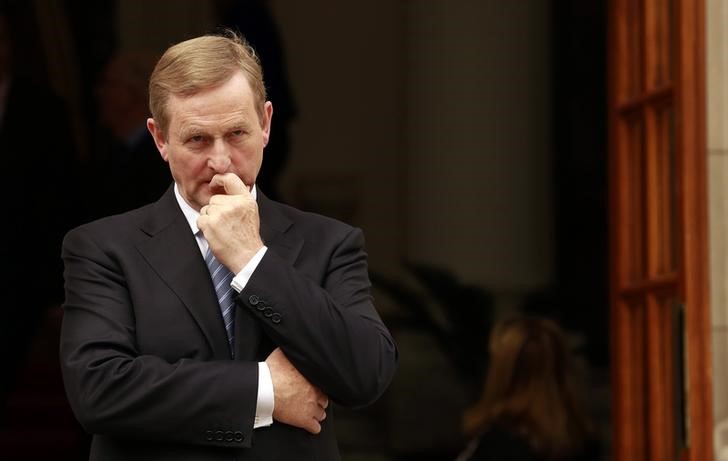By Padraic Halpin
DUBLIN (Reuters) - Opposition parties hoping to be part of Ireland's next government would not rush to sell the state's holdings in three banks to keep some influence over banking policy and to get a better return for taxpayers.
The current government has begun to claw back the costs of bank bailouts by selling shares in permanent tsb (I:IL0A) and Bank of Ireland (I:BKIR), and it plans to sell 25 percent of Allied Irish Banks (I:ALBK) (AIB) if re-elected next year.
Opinion polls show support for Prime Minister Enda Kenny's Fine Gael is growing ahead of parliamentary elections likely to be held in February or March but suggest his party and junior partner Labour remain shy of a majority.
A poor performance in the election could force Fine Gael to consider a coalition with fellow centre-right party Fianna Fail, or even an unlikely alliance with leftist challenger Sinn Fein.
After a 2008 property collapse, Ireland pumped 64 billion euros (£46.6 billion) into its banks, the most expensive rescue in the euro zone at almost 40 percent of annual economic output. The government expects to turn a profit on the half given to the three surviving banks.
"We wouldn't be in a rush to dispose of the state's shareholdings, I would like the state to retain a significant influence for the next number of years at least," Fianna Fail finance spokesman Michael McGrath told Reuters in an interview.
Fianna Fail would not hold onto the stakes indefinitely but for now the state needed "to retain some level of influence and be in some position to influence banking policy", he said.
"Certainly I would envisage that for the lifetime of the next government, if Fianna Fail were to be involved, the state would retain a direct share in one or more of the main banks and certainly I wouldn't see AIB being 100 percent privatised in the next number of years."
Still, if the conditions were right, McGrath said he would be open to selling a minority stake in AIB next year.
STATE INTERVENTION
Sinn Fein, however, says the next government should pause and provide a more rigorous analysis before launching one of Europe's biggest bank flotations since the financial crisis.
The party, which is vying with Fianna Fail to become the second largest party in the next parliament, does not want to retain stakes in the banks long term, finance spokesman Pearse Doherty said, but they worry that taxpayers will be short-changed by a sale next year.
"There is an impression out there that Sinn Fein wants to nationalise the banks and tell the directors what to do. That's not the case. Our major concern here is we're jumping into the sale of AIB without any analysis," Doherty told Reuters.
"My gut feeling is that we should not be selling the shares of AIB into the market at this time. We think that AIB is going to grow in value."
Both parties say they would hand the central bank powers to intervene in the mortgage market, a threat Finance Minister Michael Noonan did not follow through with this year when pressuring lenders to cut variable rates.
The central bank has said lenders should be free to set rates independently
"I think the minister has had more influence than he'd like to admit but he has been very reluctant to intervene in any way for fear of how attractive the banks look in the eyes of international investors," McGrath said.

"I can understand that but ultimately the government's responsibility is to ensure that the state is served by a healthy banking system and perhaps I'm old fashioned but I think that can be done while at the same time making a reasonable return for the shareholders."